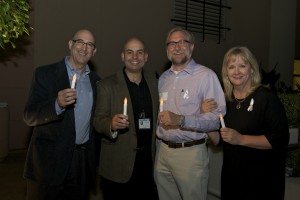Shine a Light on Lung Cancer — Event Recap
I just returned from seeing the folks in my lung cancer support group, where we were treated to a recap of the Shine a Light event from this past weekend. I got to see my speech all the way through for the first time, projected on a big screen in the conference room where we meet, and I’ll admit that I made myself tear up a bit there. It’s like I was speaking directly to me. And it made me realize how much I could have benefited from an actual stylist, but I suppose that is another story.

There were 147 people in attendance for this lovely event; next year I am hoping that we can inspire something new, like a walk organized through Downtown Los Angeles with 1,000 or more people participating. High hopes, perhaps, for an often stigmatized illness. But this is about changing perception and bringing the narrative into the 21st Century.
In the meantime, please consider supporting this petition for increasing research funding, and please share it with your friends and social networks. Nothing progresses without sharing — it is the only way to truly increase awareness. There needs to be a greater discussion around lung cancer, and around cancer in general, so that people can begin to understand what this condition truly is and how it can be safely and effectively lived with when treated early enough and with proper medical care.
Too many people are still living with a fear-based paradigm about cancer, rooted in outdated treatments and late detection. Hollywood is still making movies about what cancer was like decades ago and the scientific journals are too dense or obtuse for laypeople to easily digest. TV personalities like Dr. Oz are still offering false hopes and pseudoscientific claptrap for easy ratings by promoting dietary cures and other nonsense rather than speaking truth about the rise of medical science. In fact, Dr. Oz and his guest Dr. William Li play fairly fast and loose with the notion that the foods they recommend can actually prevent or treat cancer. The sheer volume of food that would have to be consumed to even come close to the results they imply would be difficult to tolerate at best.
Dr. Li’s main project is based in foods that have an anti-angiogenesis effect, which basically means the foods prevent the growth of new blood vessels. Part of the traditional medical treatment of cancer tumors is taking a drug to do just this. My own regimen included Avastin, which does an amazing and effective job of preventing cellular growth in a tumor. While many foods — and even hemp, which has gained much hyped up notoriety as a cancer fighter — have compounds which will do this in a Petri dish, it is entirely disingenuous for a person with a medical degree to suggest that eating some of these foods in your meals will have anything close to the same effect.
To begin with, if they did and if we ate them regularly to prevent the growth of potential cancers, we also would not heal our wounds properly or be able to feed new tissue as we grow. Beyond that, because the foods go through the regular digestive tract and disperse throughout the body, the effects would diminish during this process. There is a reason that anti-cancer drugs are given intravenously. They are specifically formulated to go where they are needed, attack the invasive cells and do their job with the biggest impact possible. They are harsh for that reason and it is not always pleasurable to take these drugs. But they do what they are designed for, effectively. No amount of cabbage or raspberries is going to even come close.
But these television personalities are making money hawking hyperbolic nonsense to the public and they will continue to do it, misinforming their viewers and doing it with an air of authority based on the degree initialed next to their names. It is wrong, but the public does not know any better and keeps supporting these comforting views in spite of the fact that they could actually lead to more harm through delayed or ignored treatments.
The Truth Is Out There
While it is difficult to cut through the volumes of information online, separating the fantasy and fear-mongering from the reality of science, it is still possible to educate one another about the massive strides that have been made in cancer care. It may require an unusual supply of patience on the part of advocates, but it can be done.
What we have to do is pay attention to the real science and use critical thinking to the best of our abilities. And we have to actively remove the fear-mongers and misinformers from the equation. It isn’t enough to merely discredit these people, some of whom may actually be well-intentioned and believe the falsehoods they are spreading. What we need to do is put forth a more powerful message, one which shows that there is positivity and hope within the realm of real treatments. A message of compassion and caring from within the modern medical establishment — without having to pander to the pseudoscientific or the desire for miracle cures that do not exist. Embracing a wider array of palliative care and making people comfortable is one thing, but encouraging any form of imaginary treatment that might be misconstrued as an option for replacing true medical care is simply outright dangerous, and sends the wrong message.
If there is to be true advocacy for lung cancer patients, for the research scientists, for the care givers who dedicate so much of their lives to helping those living with these cancers, it must begin by spreading the truth. And it must be spread passionately.
Anything less is simply acquiescing to the old paradigm.